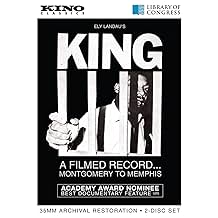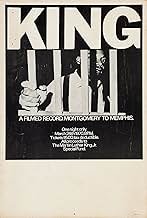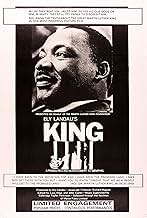Añade un argumento en tu idiomaFollows Martin Luther King's life and decades-long civil rights activism.Follows Martin Luther King's life and decades-long civil rights activism.Follows Martin Luther King's life and decades-long civil rights activism.
- Dirección
- Guión
- Reparto principal
- Nominado para 1 premio Óscar
- 1 premio y 1 nominación en total
Martin Luther King
- Self
- (metraje de archivo)
Ralph Abernathy
- Self
- (metraje de archivo)
James Baldwin
- Self
- (metraje de archivo)
Tony Bennett
- Self
- (metraje de archivo)
Leonard Bernstein
- Self
- (metraje de archivo)
Marlon Brando
- Self
- (metraje de archivo)
H. Rap Brown
- Self
- (metraje de archivo)
Reseñas destacadas
10greg-253
After watching 103 minute edited version (the only celeb commentary by Harry Belefonte), one has to wonder why this film isn't more available to the general public. It is by far, one of the best documentary efforts to chronicle Martin Luther King Jr. as he helped push the civil rights movement forward into the public consciousness.
What makes this film special (in its condensed version) is the plainly laid out - but thoughtfully edited - chronology of Dr. King's various actions, speeches - and the public response. Other than Belafonte's opening statement, the film has no narration - which gives it an urgency. This is punctuated by King's powerful oratory (including the entire I Have A Dream speech...and segments of many others), along with footage of demonstrations, marches and material that is often hard to watch due to the racially charged violence.
Still, it is a potent reminder of our history - and should be seen by all.
What makes this film special (in its condensed version) is the plainly laid out - but thoughtfully edited - chronology of Dr. King's various actions, speeches - and the public response. Other than Belafonte's opening statement, the film has no narration - which gives it an urgency. This is punctuated by King's powerful oratory (including the entire I Have A Dream speech...and segments of many others), along with footage of demonstrations, marches and material that is often hard to watch due to the racially charged violence.
Still, it is a potent reminder of our history - and should be seen by all.
10virek213
If ever there were a documentary that could be deemed absolute required viewing, whether in classrooms or in homes, it is KING: A FILMED RECORD
MONTGOMERY TO MEMPHIS. Shown in only a handful of theaters on one single day (March 24, 1970), and released on video numerous times over the years in condensed form, this monumental documentary, some fourteen years after it was entered into the National Film Registry, is back in release on DVD in the form that people who got to see it in 1970 originally saw it, in its uncut length of just slightly over three hours.
Put together by filmmakers Sidney Lumet and Joseph L. Mankiewicz and producer Ely Landau, KING: A FILMED RECORD looks at the place that the Rev. Dr. Martin Luther King Jr. holds in American history. Having gone from a relatively unknown preacher in the early 1950s to national prominence as a result of Rosa Parks' breaking the segregation barrier on transit buses in Montgomery Alabama, King became one of the great figures of our history by making it his mission in life to see that all men, women, and children in America would be judged by what's in their heart and not by what their skin color was. In the original uncut form that had gotten it an Oscar nomination for Best Documentary Feature in 1970 (it lost to WOODSTOCK), KING: A FILMED RECORD looks at all the important moments in Dr. King's non-violent revolution that would forever change the American landscape, even if it didn't change everybody's perceptions of those different from themselves. He fought non-violently against racist governors like George Wallace, bigoted police chiefs like Birmingham, Alabama's infamous Bill Connor, led the march on Selma, and managed to get long-stalled civil rights and voting rights legislation through Congress onto the books through the signature of then-president Lyndon Johnson . All of his most important speeches are included in their full, unexpurgated form here, including the monumental "I Have A Dream" speech he made during the March on Washington of August 28, 1963, and his final "I've Been To The Mountaintop" speech he made in Memphis on the night of April 3, 1968, the night before he was felled by an assassin's bullet.
We also see how tough the struggle could be, what with the murder of Malcolm X, the formation of militaristic groups like the Black Panthers, the urban rioting, White resistance in the South, and, perhaps most important of all, the war in Vietnam, which would eventually destroy Johnson's achievements as a crusader alongside King for civil rights and also be responsible for sending thousands of poor and working-class young men, white and Negro alike, to their deaths. These are important reminders of where America was during the 1960s, how far it has come since then with the election of our first African-American president in Barack Obama, and how, in many other ways, we still have a long way to go towards full acceptance of difference and diversity in America.
All of this makes KING:A FILMED RECORD an epic film to match any that Hollywood itself ever did, but that is because the real-life story it tells is a true American epic of modern times. Martin Luther King was one of the greatest American citizens who ever lived, and this documentary ensures that his legacy will never be forgotten.
Put together by filmmakers Sidney Lumet and Joseph L. Mankiewicz and producer Ely Landau, KING: A FILMED RECORD looks at the place that the Rev. Dr. Martin Luther King Jr. holds in American history. Having gone from a relatively unknown preacher in the early 1950s to national prominence as a result of Rosa Parks' breaking the segregation barrier on transit buses in Montgomery Alabama, King became one of the great figures of our history by making it his mission in life to see that all men, women, and children in America would be judged by what's in their heart and not by what their skin color was. In the original uncut form that had gotten it an Oscar nomination for Best Documentary Feature in 1970 (it lost to WOODSTOCK), KING: A FILMED RECORD looks at all the important moments in Dr. King's non-violent revolution that would forever change the American landscape, even if it didn't change everybody's perceptions of those different from themselves. He fought non-violently against racist governors like George Wallace, bigoted police chiefs like Birmingham, Alabama's infamous Bill Connor, led the march on Selma, and managed to get long-stalled civil rights and voting rights legislation through Congress onto the books through the signature of then-president Lyndon Johnson . All of his most important speeches are included in their full, unexpurgated form here, including the monumental "I Have A Dream" speech he made during the March on Washington of August 28, 1963, and his final "I've Been To The Mountaintop" speech he made in Memphis on the night of April 3, 1968, the night before he was felled by an assassin's bullet.
We also see how tough the struggle could be, what with the murder of Malcolm X, the formation of militaristic groups like the Black Panthers, the urban rioting, White resistance in the South, and, perhaps most important of all, the war in Vietnam, which would eventually destroy Johnson's achievements as a crusader alongside King for civil rights and also be responsible for sending thousands of poor and working-class young men, white and Negro alike, to their deaths. These are important reminders of where America was during the 1960s, how far it has come since then with the election of our first African-American president in Barack Obama, and how, in many other ways, we still have a long way to go towards full acceptance of difference and diversity in America.
All of this makes KING:A FILMED RECORD an epic film to match any that Hollywood itself ever did, but that is because the real-life story it tells is a true American epic of modern times. Martin Luther King was one of the greatest American citizens who ever lived, and this documentary ensures that his legacy will never be forgotten.
More than half a century after Dr. Martin Luther King Jr. was murdered, I finally looked at this movie. It is a collection of Dr. King's appearances and the events around him, interspersed with celebrities of the day speaking in admiration, edited by two of the leading film makers of the day with the assistance of two editors, attempting to make coherent sense of what, half a century later, is a senseless and evil situation and the effort to remedy it.
It's a huge effort, and brilliantly produced. "How Did We Get Here?" is a question that needs to be examined, if only for its cautionary value.
I looked at this off a TV presentation, skipping the commercial interruptions. I did notice the note "Viewer Discretion Warranted." I suppose people think truth is something people need to be discreet about. Recent events indicate that people have let the lessons I learned as a child drop out out their thoughts, and thereby permitted these hateful actions return. Yes, discretion is required. Otherwise people might remember, and remain silent about them.
It's a huge effort, and brilliantly produced. "How Did We Get Here?" is a question that needs to be examined, if only for its cautionary value.
I looked at this off a TV presentation, skipping the commercial interruptions. I did notice the note "Viewer Discretion Warranted." I suppose people think truth is something people need to be discreet about. Recent events indicate that people have let the lessons I learned as a child drop out out their thoughts, and thereby permitted these hateful actions return. Yes, discretion is required. Otherwise people might remember, and remain silent about them.
11/18/17. A bit on the long side, but at least you get the chance to listen to the entire "I have a dream." No denying that King was a force to be reckoned with. His oratory style is reminiscent of the fiery preacher of past, and still quite effective in inspiring its listeners to bigger and better things.
We just passed what would've been Martin Luther King, Jr.'s 90th birthday, so I decided to watch this documentary. You've heard about Martin Luther King, Jr. You've probably seen footage of some of his speeches. But to truly understand him, you have to see Sidney Lumet's Academy Award-nominated "King: A Filmed Record... Montgomery to Memphis". Originally screened as a one-night event, it's now available for home viewing. The documentary consists of footage of King starting with the bus boycott in Montgomery until his funeral, emphasizing how he called upon the United States to live up to the ideals that it professed. Whether addressing racial and class issues or coming out against the Vietnam War, he was on the front lines of justice every step of the way.
The documentary includes footage of people (Harry Belafonte, Ruby Dee, Paul Newman, Joanne Woodward, etc) quoting King. It emphasizes the diversity of people who stood on the side of morality. In an era when we see racism coming back to the fore - pushed by the current demagogue-in-chief - it's more important than ever to understand King's legacy. Definitely see this documentary.
The documentary includes footage of people (Harry Belafonte, Ruby Dee, Paul Newman, Joanne Woodward, etc) quoting King. It emphasizes the diversity of people who stood on the side of morality. In an era when we see racism coming back to the fore - pushed by the current demagogue-in-chief - it's more important than ever to understand King's legacy. Definitely see this documentary.
¿Sabías que...?
- CuriosidadesThis film originally was shown at theaters as a "one-time-only" event on 24 March 1970 and ran 3 hours and 5 minutes. The proceeds from the $5 admission price were donated to the Dr. Martin Luther King Jr. Special Fund. It was later shown on US television, unedited and with limited interruption.
- Versiones alternativasA second version, edited down to 103 minutes, was released onto videotape. It is missing the celebrety narratives and an opening montage of clips of militant black leaders with violent rhetoric contrasting to clips of Dr. King's non-violent messages, but includes the original introduction by Harry Belefonte, and consists entirely of newsreel footage.
- ConexionesFeatured in ¿¡Soy lo bastante negro para ti!? (2022)
Selecciones populares
Inicia sesión para calificar y añadir a tu lista para recibir recomendaciones personalizadas
Detalles
- Fecha de lanzamiento
- País de origen
- Idioma
- Títulos en diferentes países
- Dann war mein Leben nicht umsonst - Martin Luther King
- Localizaciones del rodaje
- Empresa productora
- Ver más compañías en los créditos en IMDbPro
- Duración
- 3h 5min(185 min)
- Color
- Mezcla de sonido
- Relación de aspecto
- 1.37 : 1
Contribuir a esta página
Sugerir un cambio o añadir el contenido que falta





































